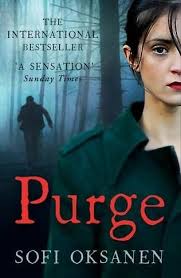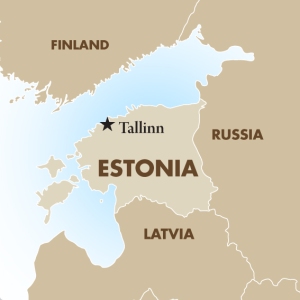 Purge by Sofi Oksanen is set in a rural village in the region of Läänemaa, west Estonia. The book is translated from Finnish by Lola Rogers.
Purge by Sofi Oksanen is set in a rural village in the region of Läänemaa, west Estonia. The book is translated from Finnish by Lola Rogers.
It is a novel of two histories, one in the late 1930’s and 1940’s when Aliide and her sister Ingel were adolescents, spanning the changes in their lives after Estonia was annexed by the Soviet Union and renamed Estonian Soviet Socialist Republic (ESSR) and the other in the early 1990’s when a Russian-Estonian girl Zara, turns up unannounced seeking refuge.
At the time of the political occupation in 1944, those who failed to do their ‘political duty’ of voting Estonia into the USSR were condemned to death and mass deportations occurred (half perished, the rest unable to return until the 1960’s).
The novel of five parts opens with a letter written by Hans Pekk, son of Eerik, an Estonian peasant entitled Free Estonia! Each of the five parts begins with one of his letters, which date from June 1949 until September 1951 and then the chapters alternate between 1992 (post-independence), when the dishevelled young woman Zara arrives at Aliide’s home and the past, revealing Aliide’s youth and the years she lived through the Soviet occupation, from 1944 until 1951.
Zara’s story flips back occasionally to 1991 in Vladivostok, Russian Federation and to Berlin the same year, before her arrival at Aliide’s home. Zara is escaping brutal captors, men involved in sex slavery, human trafficking, for whom violence is an acceptable form of discipline and retribution and sex a currency of payment.
Aliide too has her secrets, having harboured a yearning for one man for many years, an obsessive, unrequited love that lead her to make decisions and live a life of repression and lies, to trust no one and operate continuously behind a mask to protect herself and the one she loved.
As the novel progresses and switches between era’s, the stories of the two women are revealed, we move closer to learning what happened to Aliide’s sister Ingel and the letter writer, Hans Pekk.
It is a compelling read whose slow revelations fasten the pace of reading, countered by the need to pay attention to the dates, as Oksanen flips back and forth in time.
Against a volatile and dangerous political backdrop, the idealism, obsessive love and risk taking characteristic of youth is played out and repeated across the generations, leaving one to wonder if anything ever really changes with time. In particular, the burden, degradation and abuse of women during war and conflict and the strategies pursued by them for survival.
‘Aliide went toward the road and tried to find the man that the voice had come from, and she found him. He was marching like a leader toward the dairy, and three or four men were following him, and Aliide saw how the tails of his coat thrust out like they were going to take off into the wind and how the others turned toward him when they spoke, but he didn’t turn to them when he answered, , he just looked straight ahead, his brow raised, looking toward the future. And then Aliide knew he was the man to rescue her, to safeguard her life.’
 Wanting to visualise where the region of Läänemaa in Estonia was, I found it was connected to a somewhat ironic slogan, “Your safe nesting place,” a reference to the areas wetlands and meadows, providing a protective habitat to its wildlife.
Wanting to visualise where the region of Läänemaa in Estonia was, I found it was connected to a somewhat ironic slogan, “Your safe nesting place,” a reference to the areas wetlands and meadows, providing a protective habitat to its wildlife.
It is a thought-provoking metaphor in relation to the novel, where civilians required a safe place to be protected from a different kind of predator. Is that nature? To require protection from the human predator? Is there safe refuge for those persecuted by the more brutal aspects of human power seeking? If we found ourselves living in such circumstances, how would we react?
Sofi Oksanen speaking about the title:
“When I was a child,” says Oksanen, “no one talked about deportations. People ‘went to Siberia’. Certain things were so dangerous to mention that people used a lot of expressions to circumvent the actual issues.”
“When I started the play and was thinking about the title, I was thinking about the traumatic reaction people can have after they’ve experienced violence or been raped,” she says. “People always try to clean themselves. So that was the first meaning – cleansing.”
Purge was a bestseller in Finland, winning numerous literary prizes and has been translated into 38 languages. The Finnish-Estonian author Sofi Oksanen, was born in Finland and spent her summers in Estonia, visiting her grandmother on a kolkhoz, a Soviet collective farm, giving her an insight into a life not many outside it had access to. The story appeared as a play before the author wrote the novel.

A tormented young woman is given a hiding place by an elderly lady.
I feel that their lives are cross paths..but you have told me just enough (not too much) to spark my interest!
Love the nod to irony: “ironic slogan, “Your safe nesting place,” a reference to the areas wetlands and meadows, providing a protective habitat to its wildlife.”
LikeLike
Yet again I am reminded that i simply don’t read enough fiction in translation. I wish that our libraries stocked more. This is certainly a book I would like to read.
LikeLike
This one might be stocked in the library, it was quite the bestseller, translated widely and it’s something of a pageturner, though almost requires rereading with the jumping back and forth in time. The author mixes up the chronology for the sake of symbolism and metaphor and adds to the novels intrigue in doing so.
LikeLike
Great review of the book and you relate so well how Oksanen is good at making us reflect about how we would deal in such oppressive and difficult circumstances. I think she’s particularly good at slowly revealing truth and how the past relates to the present, as you describe. I’ve heard such good things about this novel from other people as well. I should really get to it as it has been on my shelf for ages. Do you think you’ll read more of her books?
LikeLike
Yesterday I tweeted a quote from the Irish Times by the Finnish author Kati Hiekkapelto, who said: ‘I have visited so many cultures, minds & emotions through reading’.
Sofi Oksansen and others like her offer us this, an insight into another world, raised within two cultures, so a kind of double insight. Even though the subject is uncomfortable, this kind of storytelling does more to raise awareness and provoke discussion than weeks of televised propoganda.
I’d definitely read her again. Her latest book Norma is already at No.1 in Finland. Something about the hair business and hiring wombs?
LikeLike
I read When the Doves Disappeared not too long ago, and it taught me quite a bit about how WWII and its aftermath played out in that part of the world. I’m planning to read Purge as well. (I gave it to my mom for her birthday, and once she’s done reading, I plan to borrow it.)
LikeLike
Fantastic, there is something about Scandinavian authors recently, there is some wonderful stuff being translated. I’ll add this one on to the list which is as big as it is because of you, which sounds accusatory but is really an appreciative nod to your choice in books.
LikeLike
I have long been intrigued by Russia, and those countries near her. I can’t explain my fascination, but I even am one class short of a minor in Russian Literature from my college days. Anyway, what a fascinating novel! I am intrigued by the cover to begin with, let alone your write up. I must get a copy.
LikeLike
I really liked this book. I learnt a lot reading it and I enjoyed reading your review.
LikeLike
By the way, if you ever get to Estonia, the KGB museum is well worth a visit.
LikeLike
Read this a couple of years ago, and found it very powerful. The shifting time-frame made it a challenge, and it’s one to go back to. The murkiness of the Second World War and Soviet times in the Baltic states is scarily portrayed, I think.
LikeLike